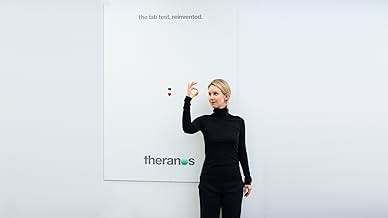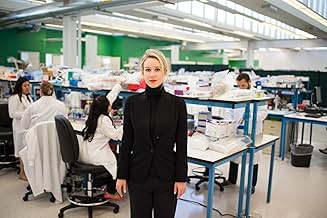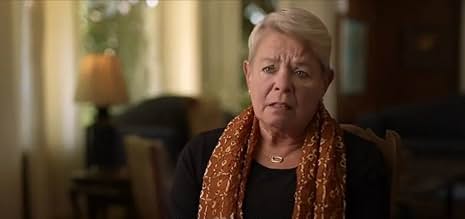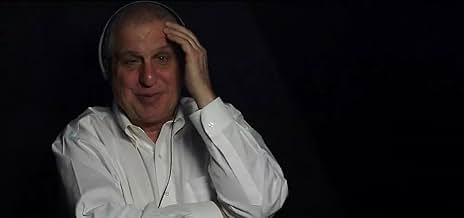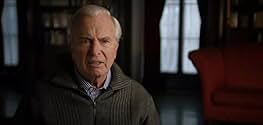NOTE IMDb
7,2/10
16 k
MA NOTE
L'histoire de Theranos, une entreprise technologique de plusieurs milliards de dollars, de sa fondatrice Elizabeth Holmes, la plus jeune femme milliardaire autoproclamée, et de la fraude mas... Tout lireL'histoire de Theranos, une entreprise technologique de plusieurs milliards de dollars, de sa fondatrice Elizabeth Holmes, la plus jeune femme milliardaire autoproclamée, et de la fraude massive qui a causé l'effondrement de l'entreprise.L'histoire de Theranos, une entreprise technologique de plusieurs milliards de dollars, de sa fondatrice Elizabeth Holmes, la plus jeune femme milliardaire autoproclamée, et de la fraude massive qui a causé l'effondrement de l'entreprise.
- Réalisation
- Scénario
- Casting principal
- Nommé pour 1 Primetime Emmy
- 2 victoires et 3 nominations au total
Elizabeth Holmes
- Self - CEO and Founder of Theranos
- (images d'archives)
Dave Philippides
- Self
- (as Dave Philippide)
Ramesh Balwani
- Self - President and Chief Operating Officer
- (as Sunny Balwani)
Avis à la une
Like others, I followed the Theranos/Elizabeth Holmes story and in addition read the excellent book that investigative journalist John Carreyrou authored and published last year (Bad Blood).
It felt that the first part of this documentary was a hagiography rather than an incisive investigative documentary - the focus on the "female Steve Jobs" perspective dominated and she certainly seemed to have the same "reality distortion field" powers he had. However, having read the book my perspective was that she, and her boyfriend/COO Sunny Balwani were bullies (via lawyer David Boies, security guards and others) to their staff , associates and others and who benefited by manipulating otherwise smart, powerful people and taking advantage of their wishful thinking. Eventually the documentary got to the reality but it felt like a long time and frankly I found some of the interviews (eg with the respected behavioral economist Dan Ariely) to be somewhat ethereal and did not add value to the story.
I have been around start-ups and understand the notion of "faking it a bit" to get to the final "vision". However, to compare her to an Edison, a Jobs or a Musk was inappropriate. in terms of her ability to manipulate, tell brazen lies and intimidate I feel a much more appropriate comparison would have been Bernie Madoff.
It felt that the first part of this documentary was a hagiography rather than an incisive investigative documentary - the focus on the "female Steve Jobs" perspective dominated and she certainly seemed to have the same "reality distortion field" powers he had. However, having read the book my perspective was that she, and her boyfriend/COO Sunny Balwani were bullies (via lawyer David Boies, security guards and others) to their staff , associates and others and who benefited by manipulating otherwise smart, powerful people and taking advantage of their wishful thinking. Eventually the documentary got to the reality but it felt like a long time and frankly I found some of the interviews (eg with the respected behavioral economist Dan Ariely) to be somewhat ethereal and did not add value to the story.
I have been around start-ups and understand the notion of "faking it a bit" to get to the final "vision". However, to compare her to an Edison, a Jobs or a Musk was inappropriate. in terms of her ability to manipulate, tell brazen lies and intimidate I feel a much more appropriate comparison would have been Bernie Madoff.
A very solid documentary, and one that hits close to home for me, so I really appreciated the depth Alex Gibney provided. I have to say first that Erika Cheung is a true hero and such an admirable person. She wanted to dream the dream but remained honest to the engineering and what the data was telling her. Tyler Schultz too. They are just kids really, and the pressure they faced was enormous, and interestingly enough Schultz's elderly grandfather George (former statesman) was a part of the problem. The documentary also shows us (yet again) the importance of a free press, and the interviews with the Wall Street Journal reporter (John Carreyrou) were one of my favorite parts, along with the commentary from behavioral scientist Dan Ariely. The footage that Gibney gets from company meetings is fantastic. I also loved the parallel he shows us to Thomas Edison, giving an example of a case in which the famous inventor followed the start-up mantra "fake it 'til you make it," as well as to other Silicon Valley entrepreneurs, which puts this story in context as well as helps explain it.
Elizabeth Holmes was brilliant at selling investors and motivating her employees with the promise of a breakthrough in blood testing, but she was woefully incompetent at building an engineering team or listening to R&D inputs. What she failed to understand is that while you can be boldly aspirational and even attempt to emulate the approach of your idol (in her case, Steve Jobs) down to his look, at the end of the day it has to be grounded in some semblance of reality. For Jobs, setting aside his massive personal flaws, he always had the ability to balance both of these things, and he always had a strong counterpart, starting with Steve Wozniak early on. Where was Elizabeth Holmes's Woz? It's telling that other than a brilliant scientist/PhD from Cambridge who was marginalized when he started injecting unpleasant truth into the discussion (ultimately leading him to commit suicide), there is no mention or interview with a VP of R&D, or VP of Engineering here. Instead we see the President, and ex-Apple guy who was also her boyfriend, operating in the same smoke and mirrors sales act as her, as well as one of the company's creative marketing / brand types. There was never any "there" there, as they say, with the result being a constant game of "pay no attention to the man behind the curtain" that snowballed.
How Holmes was able to deceive a number of powerful, older men, and then leverage that to achieve great visibility, further investment, and the Walgreens deal is pretty shocking, even by Silicon Valley standards. I've lived in the Valley for some time, and have experience with start-ups, investors, and entrepreneurs. There is often a grand vision and the joke is like that old cartoon with the calculation at the blackboard, with the step drawn at an impossible leap labeled "then a miracle occurs." There is also always going to be investor money lost in a number of startups and that's just a part of the risk - but what makes this story reprehensible is that people's health was on the line. Perhaps one thing lacking in the documentary is an interview with people who were negatively impacted, such as one woman whose bogus test results indicated she had cancer.
The young employees at Theranos understood the human factor, with Tyler Schultz pointing out (perhaps a little too glibly) that with their 65% success rate at detecting syphilis, someone could think they were STD-free and spread the disease. Holmes never seems to get this, and to the bitter end she continues lying. I thought the documentary showed remarkable restraint in not drawing a conclusion, and even showed someone say that he thought she simply dreamed it so deeply that she didn't realize she was being deceptive. I don't buy that for a second. Aside from being an awful executive, she's an awful person, and to me comes across as a master manipulator and borderline sociopath, one cloaked in the altruistic goal of revolutionizing health care. In the end she's not stretching the truth with the aim of making this thing happen, she's lying to save her own skin. It's a chilling, chilling portrait.
Elizabeth Holmes was brilliant at selling investors and motivating her employees with the promise of a breakthrough in blood testing, but she was woefully incompetent at building an engineering team or listening to R&D inputs. What she failed to understand is that while you can be boldly aspirational and even attempt to emulate the approach of your idol (in her case, Steve Jobs) down to his look, at the end of the day it has to be grounded in some semblance of reality. For Jobs, setting aside his massive personal flaws, he always had the ability to balance both of these things, and he always had a strong counterpart, starting with Steve Wozniak early on. Where was Elizabeth Holmes's Woz? It's telling that other than a brilliant scientist/PhD from Cambridge who was marginalized when he started injecting unpleasant truth into the discussion (ultimately leading him to commit suicide), there is no mention or interview with a VP of R&D, or VP of Engineering here. Instead we see the President, and ex-Apple guy who was also her boyfriend, operating in the same smoke and mirrors sales act as her, as well as one of the company's creative marketing / brand types. There was never any "there" there, as they say, with the result being a constant game of "pay no attention to the man behind the curtain" that snowballed.
How Holmes was able to deceive a number of powerful, older men, and then leverage that to achieve great visibility, further investment, and the Walgreens deal is pretty shocking, even by Silicon Valley standards. I've lived in the Valley for some time, and have experience with start-ups, investors, and entrepreneurs. There is often a grand vision and the joke is like that old cartoon with the calculation at the blackboard, with the step drawn at an impossible leap labeled "then a miracle occurs." There is also always going to be investor money lost in a number of startups and that's just a part of the risk - but what makes this story reprehensible is that people's health was on the line. Perhaps one thing lacking in the documentary is an interview with people who were negatively impacted, such as one woman whose bogus test results indicated she had cancer.
The young employees at Theranos understood the human factor, with Tyler Schultz pointing out (perhaps a little too glibly) that with their 65% success rate at detecting syphilis, someone could think they were STD-free and spread the disease. Holmes never seems to get this, and to the bitter end she continues lying. I thought the documentary showed remarkable restraint in not drawing a conclusion, and even showed someone say that he thought she simply dreamed it so deeply that she didn't realize she was being deceptive. I don't buy that for a second. Aside from being an awful executive, she's an awful person, and to me comes across as a master manipulator and borderline sociopath, one cloaked in the altruistic goal of revolutionizing health care. In the end she's not stretching the truth with the aim of making this thing happen, she's lying to save her own skin. It's a chilling, chilling portrait.
I was struck by some of the similarities between this and an ostensibly very different documentary I recently watched, about the disastrous Fyre (music) Festival. In both cases, a young person managed to get older and supposedly wiser people to give them ridiculous amounts of money based purely on their chutzpah, while providing nothing in the way of oversight or verification in return. In both cases, everyone involved should have known better from the beginning.
I don't know the history of the production of this documentary, but there's a lot of very flattering footage of Holmes, so my guess is that at the heart of this, someone was working on a hagiography about her and then re-tasked the footage when things went South. This means you'll get your fill of her strange unblinking stare and weirdly affected voice.
I found very amusing that hordes of older men were quick to fawn over her (sometimes to an embarrassing degree) and support her financially, while the only person who didn't buy it was her female professor at Stanford. Is it possible these men maybe weren't thinking with their brains? I wonder (actually I don't).
Everyone compared her to Steve Jobs, and she consciously cultivated the image, but the thing everyone forgets is the Apple didn't involve any new or even challenging technology. No one doubted you could build a home computer. Jobs' genius was realizing people would *buy* one. In contrast, Holmes was claiming to have developed a revolutionary new technology that had eluded some of the biggest medical tech companies in the world, and everyone simply took her word for it with no evidence whatsoever. Imagine if instead of a computer, Jobs had claimed to have built a spaceship in his garage, and then rounded up investors without showing it to anyone. That's more like what Theranos was like.
The movie does a very good job of laying out the facts and the time line, but a central question remains unanswered; namely, when exactly did things go from "optimism" to "fraud"? Was it a scam from the beginning, or did she really think she could pull it off? Maybe that can't be answered by anyone but Holmes, and she's not saying. Even if you're very generous with your impression of her, the "adults" should have more realistic and looked out for things.
In the end, it's a cautionary tale from which I doubt anyone will learn anything.
I don't know the history of the production of this documentary, but there's a lot of very flattering footage of Holmes, so my guess is that at the heart of this, someone was working on a hagiography about her and then re-tasked the footage when things went South. This means you'll get your fill of her strange unblinking stare and weirdly affected voice.
I found very amusing that hordes of older men were quick to fawn over her (sometimes to an embarrassing degree) and support her financially, while the only person who didn't buy it was her female professor at Stanford. Is it possible these men maybe weren't thinking with their brains? I wonder (actually I don't).
Everyone compared her to Steve Jobs, and she consciously cultivated the image, but the thing everyone forgets is the Apple didn't involve any new or even challenging technology. No one doubted you could build a home computer. Jobs' genius was realizing people would *buy* one. In contrast, Holmes was claiming to have developed a revolutionary new technology that had eluded some of the biggest medical tech companies in the world, and everyone simply took her word for it with no evidence whatsoever. Imagine if instead of a computer, Jobs had claimed to have built a spaceship in his garage, and then rounded up investors without showing it to anyone. That's more like what Theranos was like.
The movie does a very good job of laying out the facts and the time line, but a central question remains unanswered; namely, when exactly did things go from "optimism" to "fraud"? Was it a scam from the beginning, or did she really think she could pull it off? Maybe that can't be answered by anyone but Holmes, and she's not saying. Even if you're very generous with your impression of her, the "adults" should have more realistic and looked out for things.
In the end, it's a cautionary tale from which I doubt anyone will learn anything.
"The Inventor: Out for Blood in Silicon Valley" (2019 release; 120 min.) is a documentary about the rise and fall of Elizabeth Holmes and her biotech company Theranos. As the movie opens, we are in 2014, at the peak of the company's might and moving into spectacular new headquarters in Palo Alto. The voice over informs us that "within 4 years, the company would go from being valued at $10 billion to less than zero. This is a cautionary tale." We then are introduced to Holmes' background, what an over-achiever she always was, and eventually leading her to drop out of Stanford at age 20, and instead use the tuition money as seed money for Theranos, which Holmes envisioned as providing low-cost access to blood testing. As the company grow, staff is enthused, female employees see Holmes as a hero, and publications like Fortune and inc. provide glowing coverage. But the company isn struggling with he manufacture of its Edison testing kit... At this point we're 15 min. into the movie, and you'll just have to see for yourself how it all plays out.
Couple of comments: this is the latest documentary from Alex Gibney, whose 2013 "The Armstrong Lie" is just one of his many outstanding films. Here he looks at Holmes and Theranos. Can the two be separated? It'd be difficult to do so, as it almost feels like Holmes built a cult of personality within Theranos. When a company grows so spectacularly and then implodes with an even greater bang, it always makes for fascinating viewing/reading/studying. Gibney seems to have gone all out in interviewing the relevant characters, including journalists and ex-employees. And then there is former Secretary George Schultz, now in his 90s, and still going strong. He introduces Holmes to his grandson, who ends up working at Theranos and see it all go wrong. Wow. The movie also benefits from the inclusion of the interview of a behavioral economist, who puts it all into context. At the beginning we are told this is a cautionary tale, and that it certainly is, but it's a lot more than just that.
"The Inventor: Out for Blood in Silicon Valley" recently premiered on HBO and I finally watched it on demand the other night. I have a soft sport for non-fiction in general, including in films and in books. As soon as I saw the name Alex Gibney associated with this, I was pretty sure that this would be worth checking out, and I was right. If you love documentaries, I'd readily suggest you check it out, be it on VOD or eventually on DVD/Blu-ray, and draw your own conclusion.
Couple of comments: this is the latest documentary from Alex Gibney, whose 2013 "The Armstrong Lie" is just one of his many outstanding films. Here he looks at Holmes and Theranos. Can the two be separated? It'd be difficult to do so, as it almost feels like Holmes built a cult of personality within Theranos. When a company grows so spectacularly and then implodes with an even greater bang, it always makes for fascinating viewing/reading/studying. Gibney seems to have gone all out in interviewing the relevant characters, including journalists and ex-employees. And then there is former Secretary George Schultz, now in his 90s, and still going strong. He introduces Holmes to his grandson, who ends up working at Theranos and see it all go wrong. Wow. The movie also benefits from the inclusion of the interview of a behavioral economist, who puts it all into context. At the beginning we are told this is a cautionary tale, and that it certainly is, but it's a lot more than just that.
"The Inventor: Out for Blood in Silicon Valley" recently premiered on HBO and I finally watched it on demand the other night. I have a soft sport for non-fiction in general, including in films and in books. As soon as I saw the name Alex Gibney associated with this, I was pretty sure that this would be worth checking out, and I was right. If you love documentaries, I'd readily suggest you check it out, be it on VOD or eventually on DVD/Blu-ray, and draw your own conclusion.
Having read the book, Bad Blood, written by the journalist who broke the Wall Street Journal story, and having been shocked and absolutely disgusted by Holmes and Sunny, I found this to be oddly lighthearted and unfocused. It skipped so much of what made the story truly horrifying and would have benefited from being extended in a format such as Wild Wild Country. Maybe not quite to that length, but a deeper look would have been so fascinating, especially with the addition of the film. I would still encourage you to view it, though, if you are not well read on the case. Not horrible, but I was disappointed.
Le saviez-vous
- AnecdotesThe film's producer met with Elizabeth Holmes early in development, before criminal charges were filed, to determine whether she could be interviewed for the film. Ultimately the director decided he wanted to portray how Holmes carefully crafted Theranos and her own image to be seen by the public, up until the story unraveled. Accordingly, aside from brief footage from her deposition, all footage of Holmes seen in the film is from archival material from before she was charged, most of it her own commissioned promotional video for Theranos. Alex Gibney remarked "She made the documentary she wanted me to invest in and I used it to a different purpose."
- ConnexionsReferenced in Film Junk Podcast: Episode 702: Dragged Across Concrete (2019)
- Bandes originalesU Can't Touch This
Written by M.C. Hammer (as Stanley Kirk Burrell), Rick James & Alonzo Miller
Performed by M.C. Hammer
Courtesy of Capitol Records
Under license from Universal Music Enterprises
Meilleurs choix
Connectez-vous pour évaluer et suivre la liste de favoris afin de recevoir des recommandations personnalisées
- How long is The Inventor: Out for Blood in Silicon Valley?Alimenté par Alexa
Détails
- Date de sortie
- Pays d’origine
- Langue
- Aussi connu sous le nom de
- Untitled Alex Gibney/HBO Project
- Sociétés de production
- Voir plus de crédits d'entreprise sur IMDbPro
- Durée
- 1h 59min(119 min)
- Couleur
- Mixage
- Rapport de forme
- 16:9 HD
Contribuer à cette page
Suggérer une modification ou ajouter du contenu manquant



